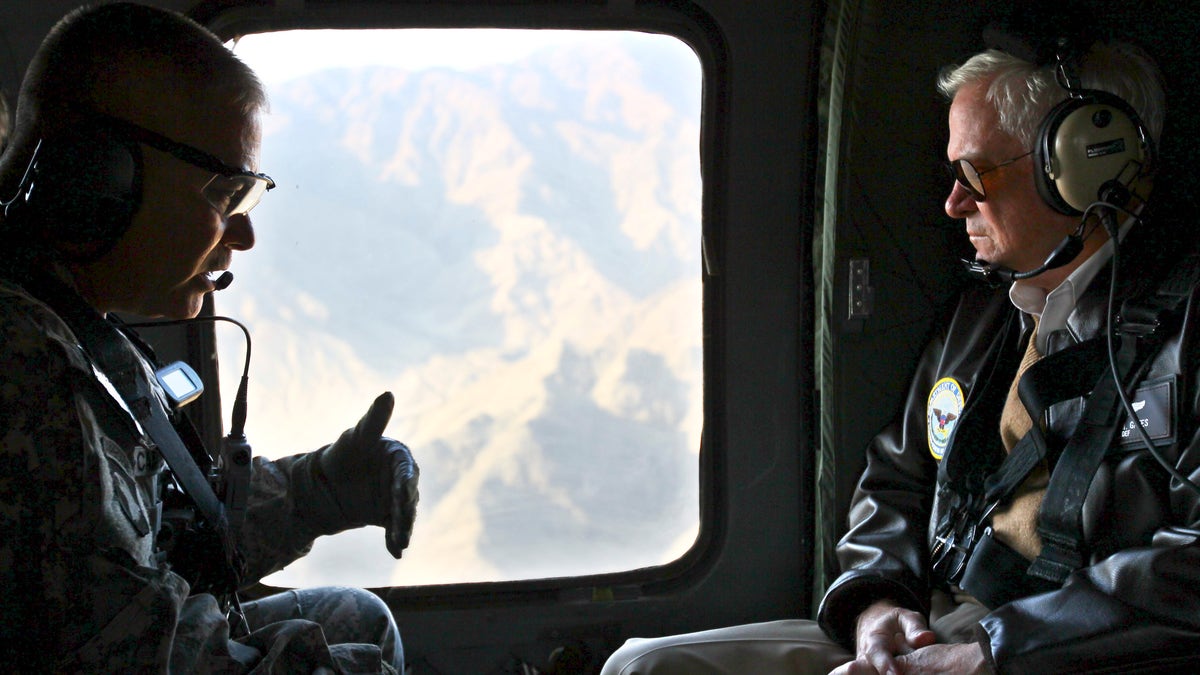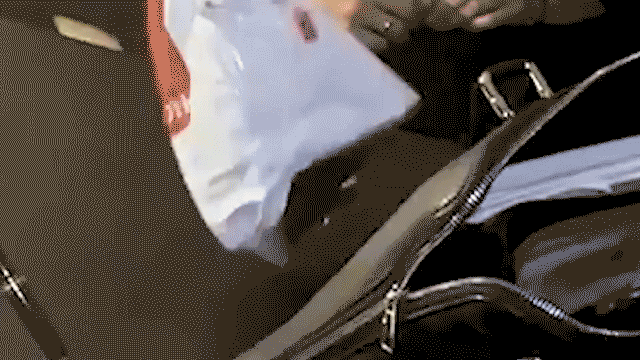
Dec. 7: Defense Secretary Robert Gates, right, receives a briefing from Major Gen. John Campbell, left, as they fly aboard a helicopter over Kunar Province, Afghanistan. The U.S. and NATO predict heavier fighting this winter. (AP)
BAGRAM AIR FIELD, Afghanistan – The latest White House review of the war in Afghanistan to be released Thursday will show that coalition forces have relied heavily on air strikes and night raids against insurgents as part of the overall strategy, U.S. and NATO officials said.
The emphasis such counterterror operations — aimed at killing and capturing militants — could reflect the difficulties the U.S. military has faced in carrying out the other, main part of its strategy, known as military parlance as counterinsurgency, or COIN — to clear the enemy out of a particular territory, then focus on holding and developing it to win over the local Afghan population.
"It may be an indication that U.S. goals in Afghanistan and Pakistan are being narrowed from a broad COIN mission to something closer to the stated goal of disrupting and defeating al-Qaida," said Rick Nelson, a retired Navy officer who served in Afghanistan last year and is now a counterterrorism expert at the Center for Strategic and International Studies in Washington.
NATO officials say both are part of the overall strategy being employed by Gen. David Petraeus, the commander of American and NATO forces in Afghanistan. The alliance insists that at the same time that the coalition has stepped up counterterror operations, it also has increased its work to bring development and better governance to Afghanistan's 34 provinces.
But the long-awaited review of the war strategy that President Barack Obama is due to release on Thursday will show a greater than expected emphasis on counterterror operations, said NATO and U.S. military officials, speaking on condition of anonymity because the review has not yet been released.
Nelson said that doesn't mean that counterinsurgency, the lifeblood of Petraeus' strategy, is being abandoned. But the shift in emphasis demonstrates that U.S. and NATO forces ultimately need to be able to target senior Taliban and al-Qaida leaders who live in Pakistan.
"This means cutting lines of communication, interdicting supply lines, and putting pressure on safe havens across the border" in Pakistan, Nelson said.
On Wednesday, the commander of NATO forces in eastern Afghanistan predicted heavier fighting this winter, with more militants staying in Afghanistan instead of slipping over the border into Pakistan.
Maj. Gen. John Campbell, commander of NATO coalition forces in eastern Afghanistan, told reporters that attacks typically decrease over the winter months, as Taliban and other insurgent footsoldiers sit out the coldest weather in hideouts on Pakistan's side of the fluid, rugged border.
"We think right now — what our intelligence is telling us — we're probably going to see about a 15 to 20 percent increase in the amount of attacks compared to the same time frame of 2009," he said at Bagram Air Field, about an hour's drive northwest of Kabul. "So, we think many are going to stay and try to fight."
Marine Gen. James Cartwright, vice chairman of the Joint Chiefs of Staff, hinted at the heavier emphasis on counterterrorism missions earlier this month in an interview with The Associated Press. He said then that, because of the realities on the battlefield, the war assessment would include adjustments to the current strategy — things like the "balance" of counterinsurgency to counterterrorism.
In a speech last week at the National Press Club, Cartwright said: "When we started, we probably were more aligned with counterinsurgency. The emphasis is shifting."
That is because the coalition needs to reduce the number of militants who attack in Afghanistan and then escape to Pakistan, out of the reach of coalition forces, he said.
"So the balance of the force that was really weighted more toward counterinsurgency is starting to shift to have an element of counterterrorism larger than we thought we were going to need when we started," he said.
The two approaches were hotly debated for months before Obama embraced a hybrid strategy incorporating elements of both when he ordered 30,000 U.S. reinforcements to Afghanistan one year ago.
At the same time that coalition troops are working to rout insurgents, secure population centers and bolster governance, special forces operations captured 2,469 insurgents and killed 952 insurgents in the 90-day period ending Dec. 2, according to coalition figures.
The coalition also has ramped up the air war in Afghanistan since this summer. In the first 11 months of the year, coalition aircraft have used 5,465 bombs and Hellfire missiles, exceeding the 4,184 dropped in all of last year.
A heavier emphasis on military might, as part of the overall war strategy, departs from Petraeus' belief that killing and capturing insurgents on a large scale is self-defeating. The theory has been that for every insurgent captured or killed, the coalition forces made multiple enemies and helped recruit new fighters. Petraeus has repeatedly said that the coalition cannot kill or capture its way out of the insurgency.
Andrew Exum, a civilian adviser to former Gen. Stanley McChrystal, said if the coalition is shifting strategies it's news to Petraeus and his commanders.
"That having been said, it is true that the United States and its allies will eventually shift away from counterinsurgency toward a more limited counterterrorism mission between now and 2014," said Exum, who just returned from Kabul on Tuesday. "I do not see that shift taking place anytime in the next 12 months, though."
The review is expected to identify insurgent safe havens in Pakistan as a stubborn problem that U.S. pressure on Pakistan has done little to address.
Adm. Mike Mullen, chairman of the Joint Chiefs of Staff, on a holiday USO tour to the front lines of the war, said the U.S. will continue to press its case with Pakistan that routing insurgents in bordering North Waziristan is in the interest of both Pakistan and the United States. But U.S. officials have largely concluded that Pakistan is unwilling to mount a major offensive in North Waziristan, partly because it would be too labor-intensive and would be too politically risky.
Former U.N. envoy to Afghanistan Kai Eide warned against escalation of military operations in an opinion piece released Wednesday that calls for a political solution to the war.
It is time to recognize that there are "serious flaws" in the U.S.-led war strategy, Edie wrote in the piece, which suggests cease-fires as a means of curbing the fighting.
"The counterinsurgency strategy does not work in the Afghan context," he wrote. "Instead of a 'clear-hold-build' strategy, it has — predictably — become a 'clear and clear again' exercise."
"More of the same will only bring greater resentment among the population and greater stubbornness in the insurgency."
Eide also said that military pressure will not nudge the insurgents to the negotiating table.
"The Taliban will not allow itself to be humiliated into a dialogue," he wrote.








































